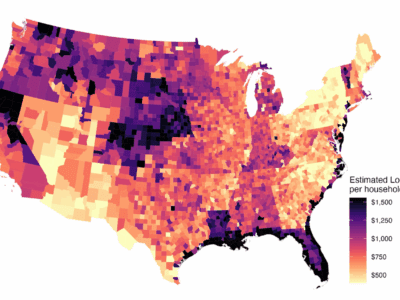Trump’s “Great Honor” to Fund the Great Lakes Restoration Initiative is a Great Falsehood
Trump Mischaracterizes His Administration’s Attempt to Defund Important Program to Protect Environmental Quality in the Great Lakes
Late last week, Donald Trump promised to fully fund the Great Lakes Restoration Initiative, a program of the Environmental Protection Agency that provides resources to address environmental quality issues in the Great Lakes. His hollow promise obscures the fact that the Trump administration has worked hard to dismantle this program through taking away its funding, and is especially ironic since Congress has repeatedly ignored the administration’s attempts to defund and destroy the initiative.
The program provides funding to tribes, local governments, universities, and nongovernmental organizations to address the following important drivers of environmental quality in the Great Lakes:
- Toxic Substances and Areas of Concern
- Invasive Species
- Nonpoint Source Pollution Impacts on Nearshore Health (formerly Nearshore Health and Nonpoint Source Pollution FY2010-2014)
- Habitat and Species (formerly Habitat and Wildlife Protection and Restoration FY2010-2014)
- Foundations for Future Restoration Actions
In theory, this is a type of program that should be embraced by politicians and policymakers of both parties, embracing a model of providing resources to those outside the federal government who can work to address these important problems. In practice, as well, it has received bipartisan support in Congressional budget bills. The Trump administration has stood alone in attempting to defund the initiative, even as recently as three weeks ago, making his speech claiming credit for supporting it especially bizarre and ironic.
What Trump said, precisely, was:
I support the Great Lakes. Always have. They’re beautiful. They’re big. Very deep. Record deepness, right? And I’m going to get, in honor of my friends, full funding of $300 million for the Great Lakes Restoration Initiative, which you’ve been trying to get for over 30 years. So we’ll get it done. It’s time. It’s time. You’ve been trying to get it over 30 years. I would say it’s time, right?.
Interestingly, he got the funding amount, and the name of the program, correct (though not the “record deepness” part).
I hate to admit this, but… no, not record deepness. Not in the world or in the United States.
— Lake Superior (@LakeSuperior) March 29, 2019
But he got everything else wrong, including his own administration’s position on the program. Various commentators have noted both that President Obama started and continued to fund the program, and that Trump’s budget proposal, released just a few weeks ago, included a 90% cut to $30 million for the coming fiscal year. (Here’s a screenshot of the relevant page.)
Trump said it was his “great honor” to fund Great Lakes Restoration Initiative, “which you have been trying to get for 30 years.” In fact, Obama always funded the program, and Trump’s budget proposes a 90 percent cut. https://t.co/0b2X4upn0V via @YLindaQiu
— Annie Karni (@anniekarni) March 29, 2019
The program, which has been around since 2010, has been funded at about $300 million each year since 2011, and the Obama administration funded it at an even higher level in its initial year. (Image of the proposed budget page here.) Trump has proposed defunding it (in fact, he proposed a budget of zero for fiscal year 2018 (document image here!), but Congress–which ultimately passes the budget–has decided to fund it anyway every year. So, as others have pointed out, his idea that anyone has unsuccessfully “been trying to get” funding at that level for “over 30 years” is a lie.
In short, everything Trump said in his Michigan speech about the Great Lakes Restoration Initiative is false (consistent with many other incorrect statements he’s made about environmental policy, as Dan Farber has pointed out). The program started under Obama in 2010, with over $400 million in funding. It’s been funded at a level of around, or greater then, $300 million every year since. And Congress has approved that funding in recent years despite the Trump administration’s objections, including its proposal of zero funding for Great Lakes Restoration Initiative in the past, and its proposal, just a few weeks ago, of a 90% cut for the coming year. Congress has funded it anyway, over and over, and surely will fund it again.
Some defenders of Trump online have suggested Trump’s reversal remedies any flaws in his administration’s approach to this program. But his speech doesn’t change the reality of the situation–not the administration’s history of proposing defunding, and not its current budget proposal. As I noted back in November 2016, his speeches aren’t his policy. His rhetoric is sometimes overheated and authoritarian, sometimes aggressively anti-science and public health, always self-aggrandizing, and–occasionally, like here–pandering to a superficial interest in environmental quality based on the political needs of other GOP politicians. But what’s most important is the policy his administration supports. His administration’s proposed budget still says what it says in writing, and not what he says on the stump. And this budget is consistent with the administration’s overall approach to environmental quality: they are trying to starve the agency of its power, even where, like here, there is broad support for it.
The good news in this instance is that the media has reported widely the discrepancy between rhetoric and policy here. In that 2016 post, I noted:
Chief among many failures in reporting on the campaign was the tendency of major newspapers and television outlets to focus on candidates’ rhetoric, symbolism, and character, to the virtual exclusion of governance and policy. This contributed to confusion and apathy about how each candidate was most likely to govern. To those of us who have been paying attention, it’s no surprise that Trump’s close advisors and likely Cabinet appointments include Wall Street bankers, shills for the oil industry, lawyers and lobbyists for heavy industry, and anti-regulatory ideologues. And it’s therefore no surprise that his administration is likely to pursue an anti-consumer and anti-environment agenda and to favor big business and wealthy investors over other interests. But it seems that many people missed this.
By contrast, the reporting on this speech in mainstream media universally focused on the distance between the Trump administration’s policy (as shown in the proposed budget) and the words he speaks. (Well, there was also plenty of reporting on his ridiculous comment “Record deepness,” to be fair.) It appears that his ostensible change of heart was motivated by a discussion with Michigan GOP lawmakers, who convinced him the program was a “big issue” for them. With some recent “flips” in Michigan’s U.S. House districts from Republican to Democratic representation, I suppose it isn’t a surprise that GOP lawmakers are trying to help the administration to seem more supportive of environmental protection. But politics aside, the story Trump tells here is false, and it’s very telling.







Reader Comments